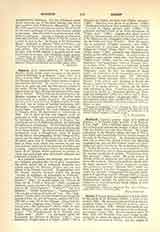

Gahan, WILLIAM, priest and author; b. June 5, 1732, in the parish of St. Nicholas, Dublin; d. there, December 6, 1804. He entered on his novitiate in the Augustinian Order, September 12, 1748 and made his solemn profession September 18, 1749. Shortly afterwards he was sent to Louvain, where he commenced his ecclesiastical studies, June 1, 1750. He was ordained priest May 25, 1755, but remained some years longer in the university to obtain his degree of Doctor of Divinity. In 1761 he returned to Dublin, and the supply of parochial clergy at the time being insufficient, he was asked by Archbishop Lincoln, and was permitted by his superiors, to take up the work of a curate in St. Paul’s Parish. After three years in this capacity he returned to his convent in St. John’s Street, where, the in leisure intervals of an ever-active missionary life, he composed the well-known “Sermons and Moral Discourses”, on which his literary reputation chiefly rests.
These “Sermons” have gone through several editions (7th ed., Dublin, 1873); they are characterized not so much by exceptional eloquence as by solid learning and genuine piety. Dr. Gahan held the office of prior from 1770 to 1778, and also from 1803 until his death in the following year. In 1783 he was made provincial of his order, an office which he continued to hold for some years. In 1786-7 he travelled through England, France, and Italy. About 1783 he made the acquaintance of Dr. John Butler, Bishop of Cork, who afterwards turned Protestant on his succession to the title and estates of Dunboyne. A frequent and friendly correspondence took place between these two, and the grief which Dr. Gahan felt for the fall of his friend (1787) was turned into joy when he attended Lord Dunboyne on his deathbed, and received him back into the Church (1800). For this, however, he was to suffer. In spite of Dr. Gahan’s advice and that of Dr. Troy, Archbishop of Dublin, Lord Dunboyne insisted on willing his County Meath estate to the trustees of Maynooth College, recently founded (1795) by the Irish Parliament. But as the will was disputed, and the issue of its validity, according to the law then in force, depended on whether or not the testator had died “a relapsed Papist”, Dr. Gahan was compelled to appear as a witness, and was asked to reveal the nature of his ministrations to the dying nobleman. He refused, of course, to do so, and after undergoing six painful examinations in the Chancery office in Dublin, he was committed to jail at the Trim assizes, August 24, 1802, to which the case had been referred for final judgment, his persistent refusal to testify as to the religion in which Dunboyne had died being ruled by the presiding judge, Lord Kilwarden, to constitute contempt of court. This imprisonment, however, lasted only a couple of days, and the remainder of Dr. Gahan’s useful life was passed in peace in his convent in Dublin, where he died holding the office of prior. As there were no Catholic cemeteries at the time, his remains were laid to rest in the graveyard attached to St. James’s Protestant Church. Besides the “Sermons” already spoken of, Dr. Gahan published the following works: “A History of the Christian Church“; “The Christian‘s Guide to Heaven, or complete Manual of Catholic Piety”; “A Short and Plain Exposition of the Catechism”; “Catholic Devotion” “A Short and Easy Method to Discern the True Religion from all the Sects which undeservedly assume that name”; “Youth Instructed in the Grounds of the Christian Religion“; “The Devout Communicant” (a revision of Father Baker’s original); “The Spiritual Retreat, translated from the French of Bourdaloue” “An Abridgment of the History of the Old and New Testament“, i.e. of Reeve’s translation from the French of Royamount.
P. J. TONER

